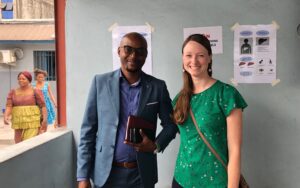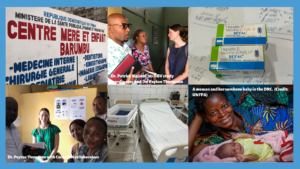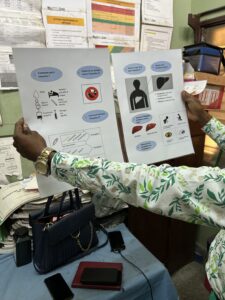As the World Health Organization pushes to eradicate the Hepatitis B virus (HBV) by 2030, preventing vertical transmission is key, says Peyton Thompson, MD, MSCR, Assistant Professor of Pediatric Infectious Diseases. But despite widespread availability of effective childhood vaccines, HBV remains endemic throughout sub-Saharan Africa, including the Democratic Republic of the Congo (DRC).
“Many of the pregnant individuals who are infected don’t have good access to healthcare, and a lot of them don’t even know they’re infected,” explained Dr. Thompson, a member of the Infectious Disease Epidemiology and Ecology Laboratory (IDEEL), a network of researchers based at the Institute for Global Health and Infectious Diseases, focused on infectious disease prevention in low-resource settings. “Without elimination of the vertical transmission, it’s going to be impossible to eliminate Hepatitis B.”

Thompson is passionate about HBV prevention and steadily advancing research that will pave the way for virus-free generations in sub-Saharan Africa. Her work has already made an impact and is driving a united effort. In March 2021, the Coalition for Global Hepatitis Elimination recognized her studies in a synthesis of research updates during an international meeting designed to coalesce a community of practice around HBV prevention.
This meeting highlighted Thompson’s 2018-2019 feasibility study with Jonathan Parr, MD, MPH and Marcel Yotebieng, MD, PhD, MPH, (Albert Einstein College of Medicine), leveraging a patient care infrastructure for HIV prevention of vertical transmission at two clinical sites in Kinshasa. Carried out by a team of Congolese collaborators, the study screened pregnant individuals for HBV infection during routine prenatal care registration. Those who tested positive and presented at a gestational age of 24 weeks or less were included in the study. Eligible pregnant individuals with a high viral load (≥200,000 IU/mL) were considered at high risk for vertical transmission and were started on Tenofovir Disoproxil Fumarate between 28 weeks and 32 weeks of gestation. Additionally, all HBV-exposed infants received a birth-dose of monovalent HBV vaccine within 24 hours of life. Funded by a Gillings School of Global Public Health Lab Innovation Award, the results showed HBV screening and treatment using the HIV care platforms could accelerate progress towards elimination.
Research Impacting Policy

Then, in early 2020, Thompson’s study team joined a group that approached the DRC’s Deputy Minister of Health to advocate for universal birth dose vaccination and to share study results, along with representatives from the World Health Organization, CDC, and other health organizations. Their efforts were successful. In 2023, the DRC Ministry of Health agreed to recommend that the birth-dose vaccination be integrated within the current Expanded Program on Immunization (EPI) and HIV Prevention of Mother-to-Child Transmission Program.
“This was important because they began to make plans to introduce the birth dose vaccine, and this was in part because of advocacy by our larger research group,” explained Linda James, IDEEL’s Director of DRC Research Collaboration and Development.
“It was after that meeting that DRC health organizations began to synthesize research, citing papers published by Peyton. And it was really encouraging to see that they were reading what we have been able to do with our partners in DRC to move this work forward.”
After that, the National Program for Prevention of Viral Hepatitis (PNLHV) was created, and the Ministry of Public Health, Hygiene and Prevention based its recommendation to introduce birth-dose vaccine on many of the team’s studies.

The Current Project
Now Thompson’s work is building on all of her HBV research to date, to recommend a treatment plan that will prevent vertical transmission in a way that is both safe and easy.
“In the 2018-2019 feasibility study, we looked at specific criteria to know which women qualify for treatment in pregnancy, such as viral load, which is expensive and not accessible for anyone outside of a research context. Then, we asked, what if we just test and treat all positive individuals?”
 In the new study, funded by a Doris Duke Clinical Scientist Development Award to Dr. Thompson, the team is randomizing individuals who are HBV positive by point-of care testing to either receive treatment or placebo. Their babies will also get a birth dose vaccine, and this will be a new practice. Newborns currently do not receive any preventative vaccines. Thompson credits Congolese collaborators and partners who are integrated into every aspect of the study.
In the new study, funded by a Doris Duke Clinical Scientist Development Award to Dr. Thompson, the team is randomizing individuals who are HBV positive by point-of care testing to either receive treatment or placebo. Their babies will also get a birth dose vaccine, and this will be a new practice. Newborns currently do not receive any preventative vaccines. Thompson credits Congolese collaborators and partners who are integrated into every aspect of the study.
“We write the grants and help with some of the logistics, but they are on the ground doing the work and making it happen. In addition, our new study would not have launched when it did without Linda being involved and locally managing everyday logistics.”
Thompson says the birth dose vaccine needs to be given within 24 hours of birth which means close coordination is needed between the study nurses and study participants. The study has three nurses and each is assigned to a health center, staying in close contact with healthcare workers and doctors on site.
“This is the first study of its kind in a sub-Saharan African setting, and WHO is changing their guidelines right now to advocate for treating more people and lowering the threshold for when people would be treated by viral load.”
A Network of IDEEL Collaborators
“The IDEEL Lab and the people that have come together on projects aren’t only from UNC, they include other universities and collaborators. Peyton’s projects are an example of this collaboration producing results,” said James.
All of the research goes back to early collaborations established by the late Steve Meshnick, Professor of Epidemiology at Gillings School of Global Public Health, and relationships he built with the DRC’s Ministry of Health. It was because of his successful mapping of malaria, using national survey samples, that ministry officials asked Meshnick to map hepatitis viruses to improve access to diagnostics and prevention/treatment options.
“Without Steve’s work, none of this would be happening. All of us with IDEEL have been mentored in some way by him. One of the first times I met with Steve and Jonathan Parr, we engaged with collaborator Marcel Yotebieng, who also trained under Steve and got his PhD at UNC. He had a research platform for HIV among pregnant individuals that we built upon for our HBV study.”
Jonathan Parr, MD, MPH, a founding member of IDEEL, also led early HBV research in the DRC, assisting with the country’s first country-wide health survey to study the spread of hepatitis C. After discovering approximately 1 percent of patients were infected with the virus, his team was asked to conduct a similar survey on Hepatitis B.
“In my research, I like to take practical approaches to improving care, to understand local capacity and build around that,” Thompson said. “Sustainability is really key because we’re trying to build a system that better suits the people and can meet their needs.”
Researchers in the Infectious Disease Epidemiology and Ecology Lab (IDEEL) at the Institute for Global Health and Infectious Diseases are process driven investigators working in 20+ countries to improve basic understandings of pathogens. The applied nature of their work has a direct impact on the health and well-being of millions of individuals around the globe, while also having an immediate effect on health policies at all levels.
